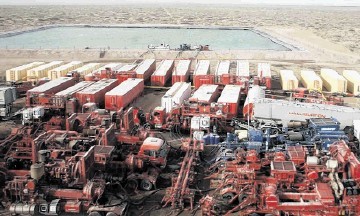
In a performance that most magicians could only dream of aspiring towards, Chancellor George Osborne delivered an alleged austerity autumn statement that both mesmerised and left red-faced the Chairman Mao little red book-waving Labour opposition.
The master magician succeeded in presenting austerity measures in a way that made them sound like irresistible offers for free trips to Disneyland.
Of course he had help. The so-called independent office for Budgetary Responsibility (OBR) produced unexpected forecasts of burgeoning future tax revenues that boosted economic revenue expectations by £27 billion and baled the Chancellor out of the tax credit hole he had dug for himself.
The timing of their revelations was such that perhaps they should be renamed as ‘Osborne’s back-pocket rabbit’ (OBR).
It would be an interesting exercise to unpick and deconstruct line-by- line the Chancellor’s speech but our focus here is to explore what was said about the North Sea oil industry and about one of the causes of its current plight, the world’s obsession with fracking.
The magician had little to say about the plight of the North Sea Industry.
Having helped establish the new regulator, the Oil and Gas Authority, he presumably is content to let events take their own course and provide no further assistance at this point, despite constant pleas for help from Oil and Gas UK whilst Brent Crude stagnates in a sticky mess at a price of $45 a barrel.
Perhaps as an afterthought, Osborne reached for his back pocket friends and quoted the OBR calculations that North Sea oil revenue had fallen by 94% since the Scottish Independence referendum result.
Rather than offer the industry a helping hand at this revelation, he sneered at how dire the situation in Scotland would have been had the result of the referendum been a ‘yes’ vote.
Given that Scotland is one third of the UK in land mass and presumably is as equal an economic force as any other part of the UK, surely an independent Scotland’s economy would have fared equally as well as that of the UK over this period?
If not, this would suggest that there is an unacceptable southern bias at play in Westminster politics.
Alternatively it could be that the UK economic resurgence has been fuelled by unfettered inflows of money into London as profit-seeking Chinese, Russian and Middle-Eastern Oligarchs force up London property values to record levels that have led to suggestions that a property bubble burst is imminent.
If that is true, and we would not bet against it, the OBR predictions of rosy economic times ahead may yet cause sleepless nights for the Chancellor and for the OBR.
The Chancellor also avoided saying the f-word ‘fracking’ which is probably wise given the UK and worldwide perceptions of pejorative connotations attached to it.
He cleverly avoided saying that the UK government was fully committed to blasting apart thousands of miles of shale beds across lovely stretches of England using countless tons of chemicals, acid, water, sand and in the process risk contaminating water courses and causing earth tremors.
No doubt the OBR would predict that all would be well in the process, jobs would be created and tax receipts would help fund the replacement of the Trident nuclear deterrent.
In practice the Chancellor actually said that a shale gas fund would be created across the shale plays in England and local communities would benefit from those funds, perhaps up to £1 billion.
This care for communities is an interesting development. Osborne now appears to accept that where economic activity takes place that leads to substantial tax revenues going to the Treasury then there should be a reciprocal payment made to the areas where that activity has taken place.
If the same approach had been adopted with respect to the exploitation of North Sea oil then Scotland would arguably now be the richest country in Europe. Setting aside the basic unfairness of this development (although one might be forgiven for suggesting the proposed payment is little more than a pay-off for the environmental degradation associated with fracking) why on earth would the UK plunge headlong into fracking for shale gas when gas prices are rock bottom?
This is economic madness, although we are sure the OBR can tell us otherwise.
The time to frack is when oil prices are high, and they will be high at some point in the future.
In addition, fracking will help keep gas and oil prices low and ensure the end of our North Sea oil industry.
Hopefully Osborne will again see reason as he did regarding the tax credits fiasco and do another U-turn.
Alex Russell is Professor of Petroleum Accounting at Robert Gordon University, Peter Strachan is Professor of Energy Policy at Robert Gordon University